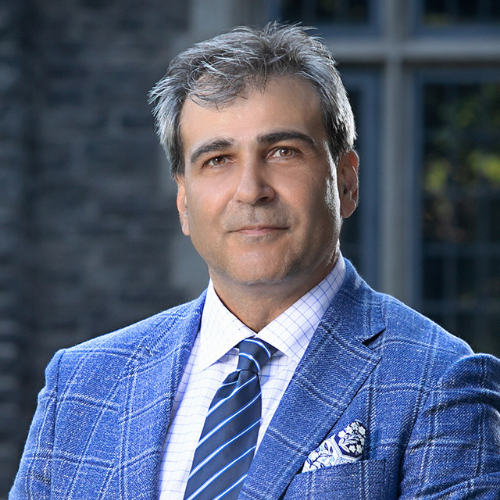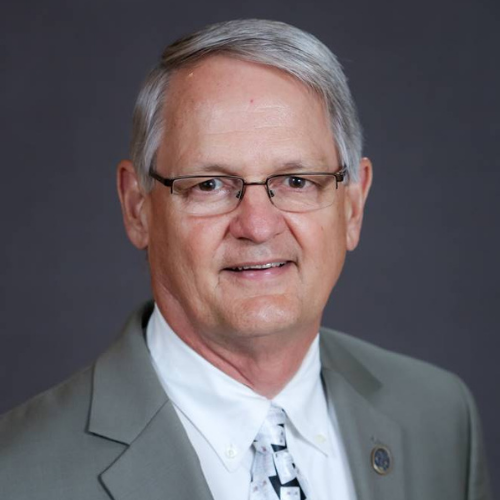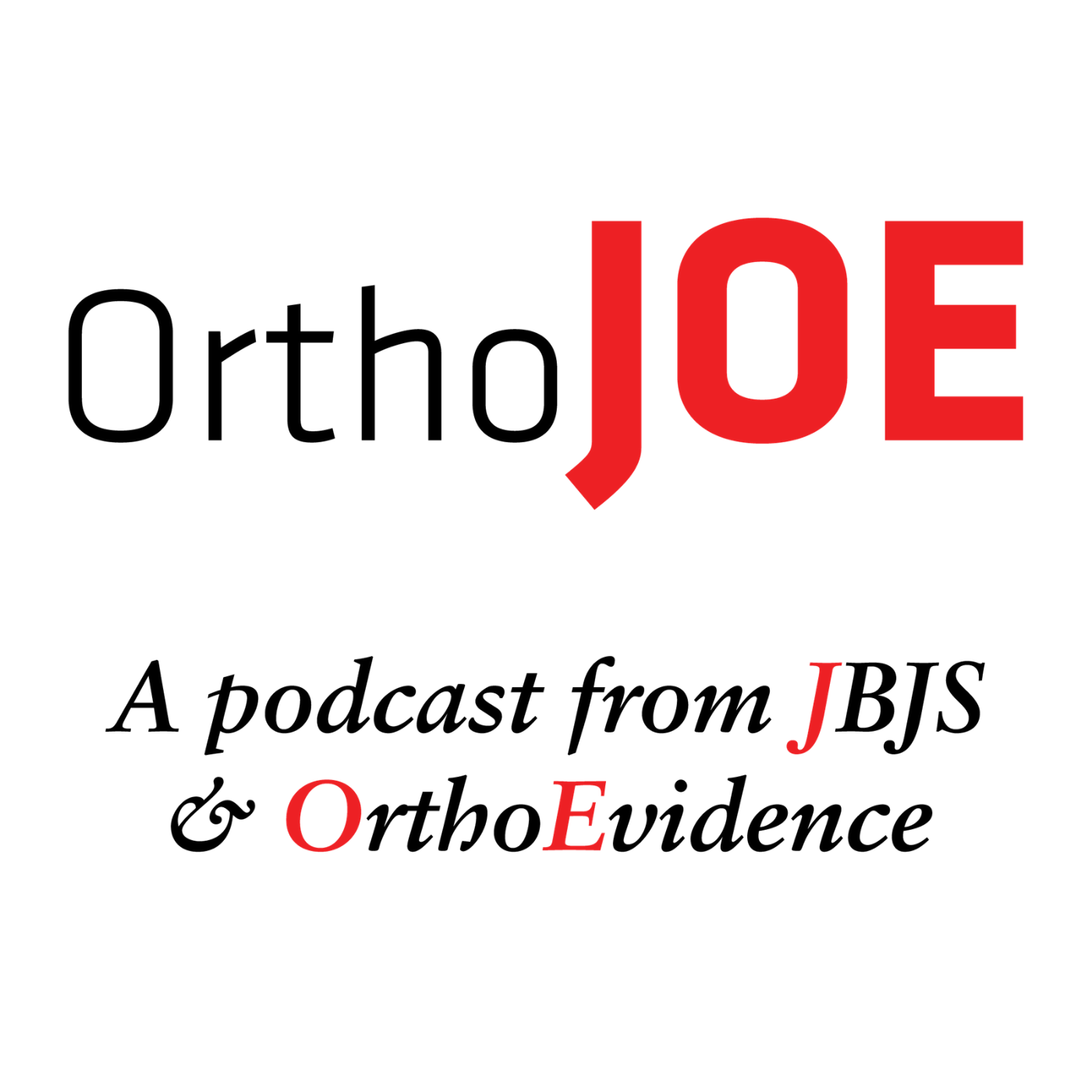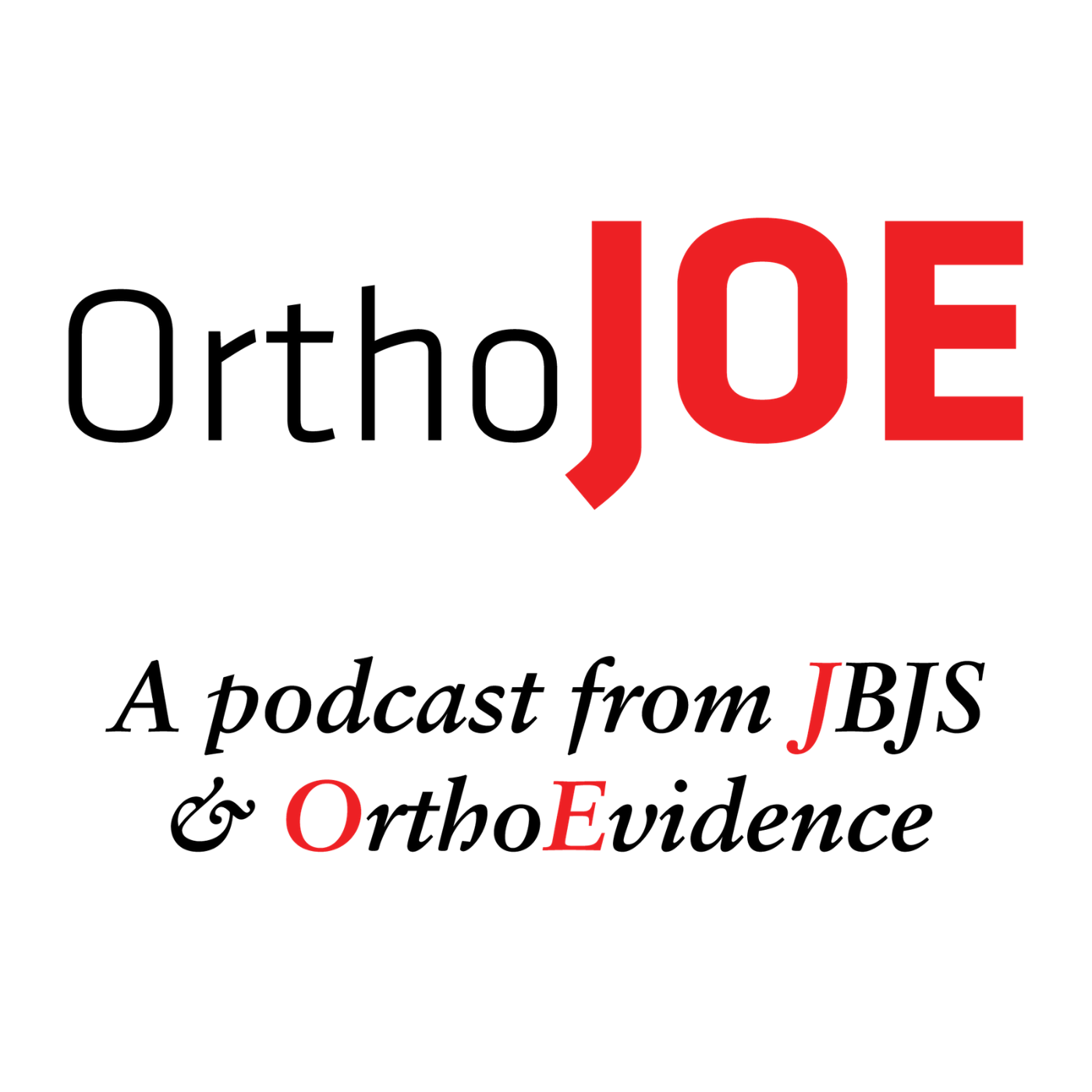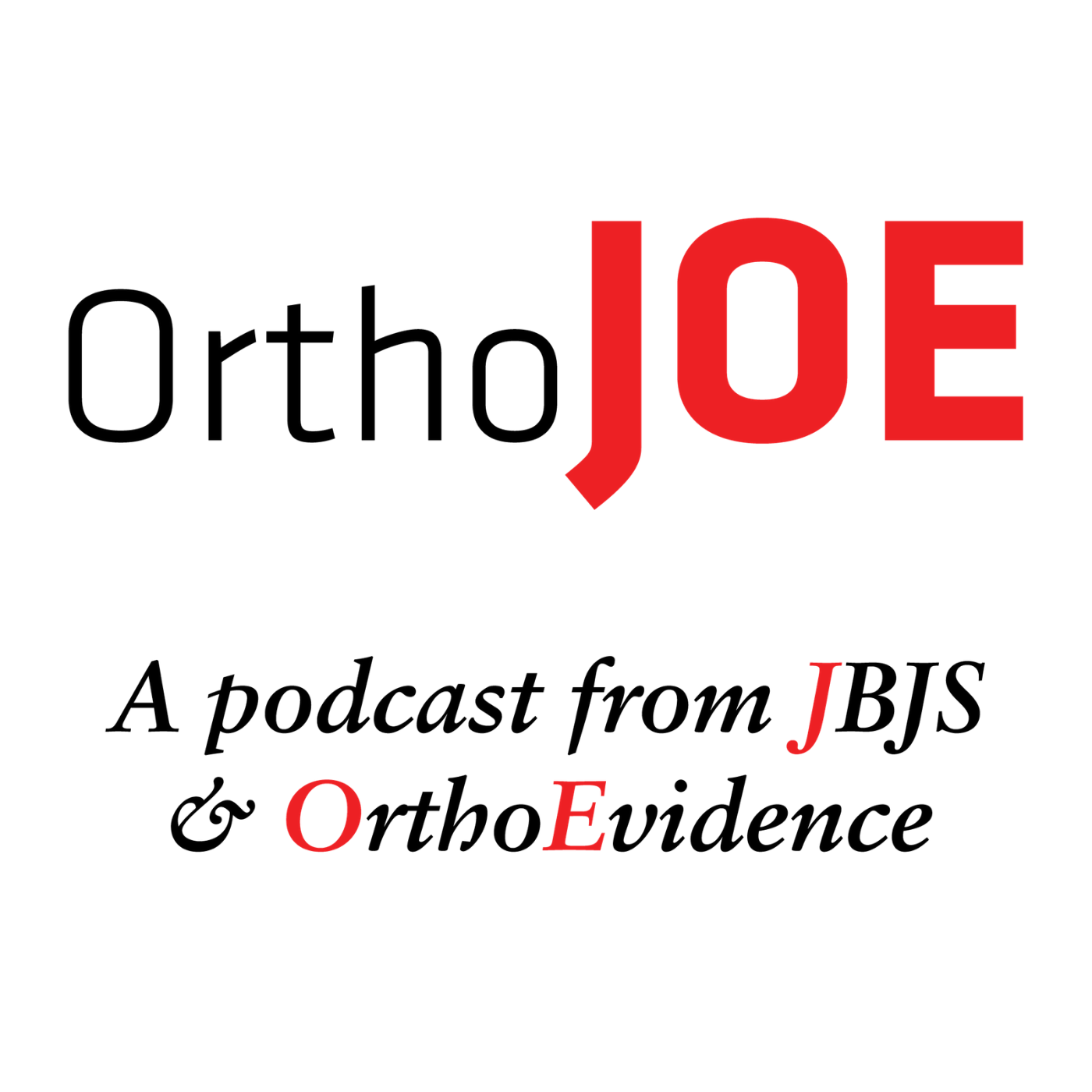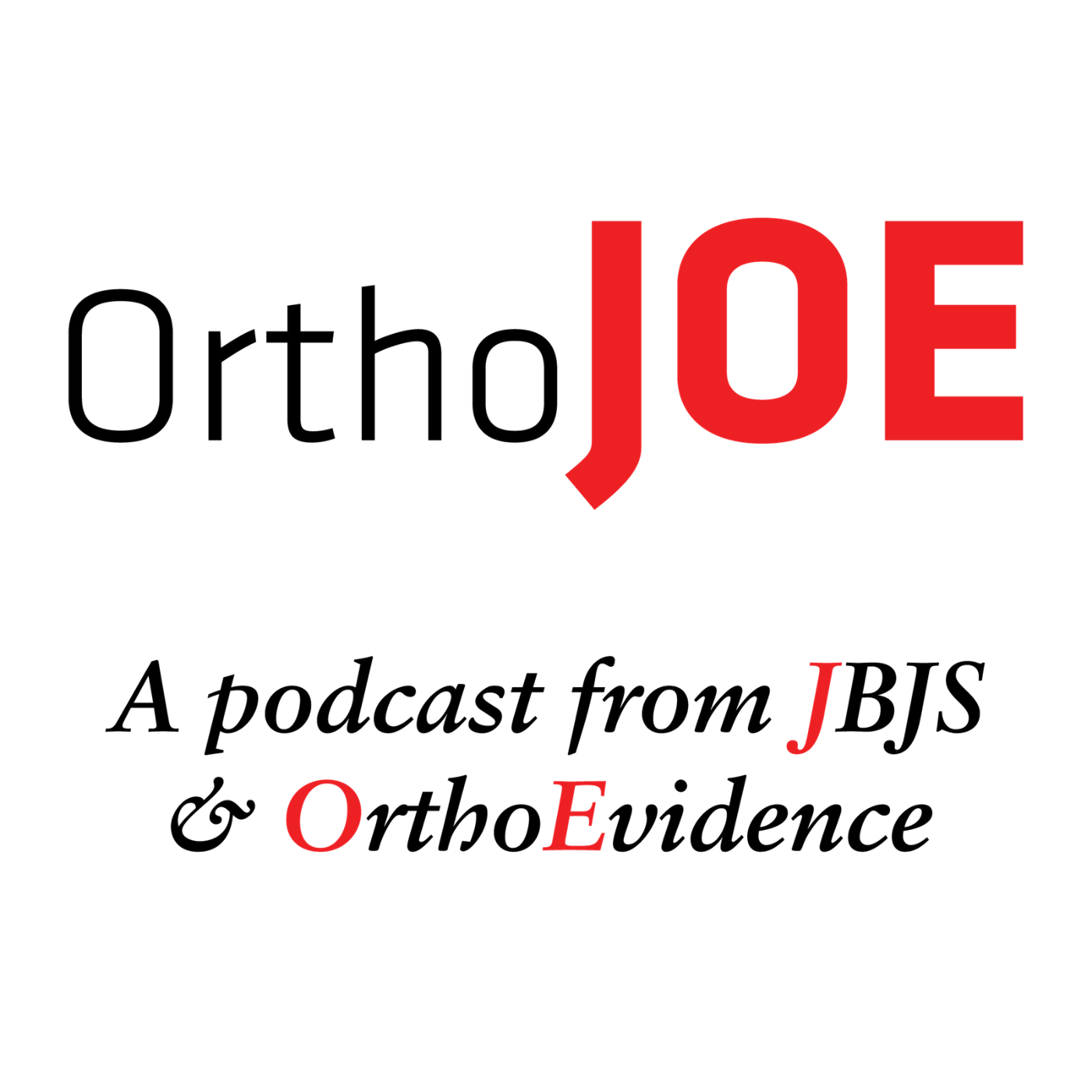Episode Transcript
[00:00:03] Speaker A: Welcome to the Ortho Joe Podcast, a joint production of the Journal of Bone and Joint Surgery and Ortho Evidence.
Join hosts Mohit Bhandari and Mark Swankowski as they discuss current topics and publications.
[00:00:15] Speaker B: In the world of orthopedics and beyond.
[00:00:19] Speaker C: Well, good morning, Mark. How are you feeling? This. Well, for us, it's a Canadian cool fall morning. So finally the temperatures have dropped a bit and so I've got my coffee. Good old kid. Importance does the trick every time.
[00:00:32] Speaker A: So jealous. I am actually sitting in a hotel room in Phoenix at the OTA meeting.
[00:00:39] Speaker C: Right.
[00:00:40] Speaker A: Six in the morning, and I haven't been able to get out to go get coffee.
[00:00:47] Speaker C: Oh, my goodness. Okay.
[00:00:48] Speaker A: Well, I'm at a meeting while good people like our guests are back at their home institutions holding down the fort. So I'll be out after coffee shortly.
[00:00:59] Speaker C: Okay. Well, you and I, if you recall, and I know you do, had a. Had a lovely chat around just reading and books we thought were important and reading even outside of orthopedics and what we thought about that. And, and we always encourage those, those who listen to kind of, you know, provide feedback. And actually we did. A Dr. Josh Blumberg, who's with us today, actually did provide some feedback. I'll let him speak to why he contacted us and why. And we're quite. We're obviously very excited to have him on board, but Josh right now is working at ThedaCare Hospital in Neenah. He's a consultant orthopedic surgeon. It's a level two trauma center there. And, you know, at this point, he has been thinking, I think it sounds to me quite deeply about life, you know, in orthopedics, but also life outside orthopedics. Welcome, Josh, and thank you so much for joining us this morning. I wonder if you could share with those who are listening and watching, what was the driver for you to contact us after, you know, hearing that podcast specifically on books we've been reading?
[00:01:57] Speaker B: Sure. First of all, thank you guys so much for having me and having this discussion with me. It's great to be here. I listened to every one of your podcasts and they're terrific.
And speaking to the podcast about books and reading outside orthopedics, I think that really struck a chord with me because in my life, I think reading outside of orthopedics has had such a positive impact on me in such a positive impact on my life that I wanted to reach out and share that impact that it had on me to encourage others to do the same.
And, you know, a Disclosure, I'm a pure non fiction reader, all right? Pure non fiction. Because I want to learn and that's nothing against fiction whatsoever. I think it's fascinating. But with my limited time, I want to maximize it with learning about things outside of orthopedics. Because I think sometimes when you're a busy orthopedic trauma surgeon, you guys know this better than me, you can get a little bit of tunnel vision in life, right? You have your family, you have orthopedics, and you sort of forget that there's an entire fascinating world moving around you that, you know. I think to try to capture some of that is. Is really important. It can be beneficial in every aspect of your life. So that's really kind of a high level reason why I reached out to you. Because for the last seven or eight years I've been an avid non fiction reader. I heavily research the best books and I wanted to share, first of all, the passion for reading and second, some of these titles and books that I've run across to hopefully benefit other people.
[00:03:32] Speaker C: That's superb. And before I know Mark will jump in with something here. But before that, you said seven or eight years ago, so what was the switch to say I've got to do this? Because you know, usually like, was it you weren't doing it and suddenly you were doing it or was it a gradual increase? Have you always been doing it since, let's say high school, university days, and you just gave it up? What was the impetus seven or eight years ago to say, I've got to change?
[00:03:55] Speaker B: So here's what happened.
So my health system had a consulting firm come in for. I don't even remember why they were here. Seven or eight years ago.
I met with the consulting firm, worked with them for a week or so on some projects.
And just by happenstance, I was at the airport and the consultant was at the airport getting on a flight as well.
And I sat next to him in the terminal and he was reading a book called Red Notice. All right by Bill Browder.
And I said, what's that book you're reading? Prior to that, I really had read very infrequently. And he said, this is the greatest book ever written. You have to read this.
And I said, okay, sure, that's great. And three days later I get the book in the mail. He mailed it to me at home and I read it and it was absolutely mind blowing. Okay. It's about the first American investor in Russia in the 80s and 90s.
And it talks a lot about the financial and economic system in Russia. But it's an entire story of this guy's adventure, working in Russia, living in Russia, dealing with the government.
And it was just so eye opening to me, partially because I had really no idea about how Russia works or anything over there. And that kickstarted it for me. I said, okay, this is really amazing.
And it just sort of snowballed from there and book after book after book. But that was the start, that random happenstance in the airport.
[00:05:35] Speaker A: Josh, you said earlier in the conversation that you have a systematic way of searching out new titles.
And that really is something I'm sure that our listeners are very much interested in. So maybe you can share your process for identifying new titles.
[00:05:53] Speaker B: Yeah, so I do it a simple way, which is going on Google or Amazon and searching for the highest rated non fiction books. And there's so many lists. And I'll peruse those lists, I'll read the summaries and I'll find some that way. The other way that's actually been more successful is a lot of the authors of the books I've listened to or have read, they have their own book lists on their website.
And so I'll go to their book lists and I'll search them and find books that way.
And I'm not being critical, there is a lot of books out there that are not that engaging or interesting, at least to me. And so it's actually quite a bit of work to find absolutely fantastic books that you cannot stop reading, at least for me. And so I just peruse and scour book lists from authors, Google, Amazon and pick my favorites.
[00:06:47] Speaker A: So you mentioned, and I'll throw it back to Mo after this. You listen to some titles and you read others.
So how does that work out?
[00:06:56] Speaker B: So probably the best purchase I've made in the last eight years was, and I have no affiliation whatsoever, is the Audible app from Amazon. Okay, it's just a listening app for books. And I have a yellow lab, a dog, and she's 11 years old.
And every single morning at 4:30, I walk her for a half hour. I walk her for 45 minutes at night. So I listen to a book over an hour a day. And I've calculated that that dog, her name's Roxy, and I have walked the length of the Pan American highway together, which is 20,000 miles in her lifetime. So I have spent, I have spent hundreds, if not thousands of hours with that dog listening to 150 books and probably a thousand podcasts.
So that's, that's how I absorb most of this content.
[00:07:47] Speaker C: So if people listening right now aren't getting at least inspired by this, I mean, I don't know how you can't be. I'm also quite inspired. You know, every so often around this time the Nobel laureates are announced and you know, we all listen with some degree of interest. But the one truism around that comes with most Nobel laureates is first of all, they're often quite shocked that they got it. I mean, usually they're like, oh, I can't believe I got it. But the other thing they talk about is I do, I listen and I interact with people and places and read things that are very different from mine. They talk with the idea of remote associations which is taking ideas from a very different field. The field that is quite siloed and you would not normally be able to, you know, it wouldn't, it wouldn't diffuse over into orthopedics if you didn't go looking for it. In your myriad of reading around books in different areas, albeit they're all non fiction, have you picked up any really interesting like, whoa. Like that's an interesting association that directly applies or things that, that have led to new creative ways of thinking about problems that you're facing in your day to day life for your job or in the work you're doing?
[00:08:48] Speaker B: Absolutely. I mean, countless things. I listen to a lot of, read a lot of books about business and finance and that's helped me a lot with my financial life, understanding money, economics, how the economy works. And it's really guided what I do with my money and savings and investing. And so that's, that's a very objective sort of thing I've, I've gleaned from a lot of my books. I've also gained a lot of sort of life advice. You know, I've read books about, you know, stoic philosophy and happiness and it's helped me, you know, I don't have to tell you guys, this is a very stressful career and you go through residency, you go through fellowship, and I would say during training, 80% of your stress at least is clinical. Right? It's just pure patient care, clinical surgery and that. And it's, that's actually wonderful. And then you get into the real world.
And I would say that the vast majority of my stress is not clinical, it's administrative work, it's logistics, it's malpractice stuff and family, you know, and we're not really well equipped to deal with all of those things. At least I didn't feel like I was. And so reading these books about how to live your life and just some reassurance that, look, life is hard, you know, it's one obstacle after the other. And I think one of the greatest things I've learned is that, you know, it's just the key to success is having a measured approach to these obstacles.
That's one thing I've learned.
And just realizing that the goal isn't the retirement or a certain amount of money.
It's just every day, right? There's no. There's no end point here. It's as good as it's going to get today, not in 10 years. And so I think that's just a few things that I've gleaned from this, from my books, from a life standpoint.
And the third thing I would say is that I read a lot of these books and it offers fascinating conversation with people, you know, about World War II, about diving, about, you know, the guy I read that slept in a tent in the woods in Maine for 23 years. I mean, that's awesome stuff to talk about at working with your friends and family. And so I think it just lends to interesting conversation, if that makes sense.
[00:11:18] Speaker C: Oh, absolutely.
[00:11:19] Speaker A: You sent us a very thoughtful list of books, and I don't think we would have time to go through all of the titles that you listed, but maybe you could just talk about how you constructed that list.
[00:11:35] Speaker B: So I think the list I gave you guys was.
I think a really hard question to answer is, what is your favorite book?
I don't know. I think a better question is, what books do you gift to people the most? Most often?
All right, so the 10 books I gave you guys, the list of 10 books. These are the books that I give to people most often.
Okay. And I think you can categorize them into life and finance, adventure stories, real life adventure stories, and biographies.
All right, so that's how I kind of categorize them. But the list of 10 books I gave you are the ones I give to people most often. And I've really found I've gotten the most out of.
[00:12:19] Speaker C: And maybe with your permission, Josh, we may append that to the notes for this particular podcast so those who are interested can get a look. And certainly, again, I know your disclosure is you have no particular interest outside of helping people share your love of reading, outside of the core orthopedic work that we all do. I have a question that I think you've already partly answered, but knowing that you're already moving to more Efficient ways of consuming, you know, consuming content through audible. But, you know, like I grew up and I still have a book in my hand. Like I read, like I like to read, you know, the COVID I like to read, you know, have a feeling of that pressure. But we're also in a world of rapid growth through AI in which attention spans are, have gone from many minutes to few seconds. Maybe like 10 to 15 seconds. How, how are you, I know you have young children. How are you modeling a love of books with them or with or with others, you know, your trainees, anyone you work with around this, you know, managing this almost sense of urgency around I have 15 seconds to catch someone's eye versus sort of the longer read, you know, spending a bit more time in depth thinking about a problem in a world that's pushing us to move faster and faster.
[00:13:29] Speaker B: Yeah. So hopefully I'll answer your question here most. So I think speaking to your point about AI and technology, you can't keep up with that reading books.
So I listen to a 20 to 30 minute podcast every day on AI in Business. That is the only way that I can even come close to keeping up with what's going on. That doesn't mean I understand it, but at least I have some idea of what's happening. Okay, so I think that's separate of the books I listen to and you know, I think it kind of depends on what books know you're referring to. You know, there's a couple books here by. I got. Got a guy named Scott Galloway who's an entrepreneur and a businessman. I don't know if you've heard of him or listen to his stuff.
[00:14:15] Speaker C: I know a lot of his work.
[00:14:16] Speaker B: Yeah, I love him. So he wrote the Algebra of Happiness and the Algebra of Wealth. And so that book I've given to a lot of residents.
That book I think is.
Should be required reading for trainees. And I think those types of books can offer some more in depth lifelong learning as opposed to the quick 20 minute update on AI in business. So hopefully that answers what you're kind of getting at there.
[00:14:39] Speaker C: Yes. And I guess I didn't follow up to that is like, you know, in the busy life of those around you, when they see you, when they see you taking time like, you know, you're clearly passionate about, about doing this, you want others to do this. Have you noticed that there's been sort of almost an osmosis of your way of life to others of others come up to you and said, hey, I really appreciate that book you gave Me, I've read it, now I'm doing more.
How do you get others excited? So this is one way you're chatting about and I hope people do get excited. But are there other strategies you've seen work around, especially the people that are around you, whether it's your family, your children who look up to you, all those sorts of things? How do you get other people excited?
[00:15:18] Speaker B: Yeah. So two ways. One, I hand out books at work unsolicited.
So I will just go to some or staff and say, here's shadow diversity. Read this.
And they will read it and come back to me and mind blowing and said is, did this guy write anything else that I could read? And I'm like, yep, Rocket Men, here you go. And so I hand out books, I hand out books to my, my family, my dad, my wife, and so I do it that way. And I also share, share books on Audible and I'll just send those out and say, and people now come to me and say, what book are you reading? What do you got for me?
What's, what's good?
And so just kind of networking that way.
[00:16:01] Speaker C: That's great.
[00:16:04] Speaker A: Yeah, that's.
Maybe you could just. For our listeners that I'm sure many of whom have an Audible account, what are the rules surrounding how many times you can share a book via Audible?
[00:16:15] Speaker B: Well, so you can share as many, you can't share unless you pay.
So.
Right. So you, you buy a certain number of credits a month on Audible.
Okay. So whatever you want, like 12 to 15 bucks of credit. And so you have to pay to share a book or you can just share the title and they can buy it themselves. So it's one of two ways you can do that.
[00:16:40] Speaker A: Okay. Yeah, very helpful.
[00:16:42] Speaker B: Yep.
[00:16:44] Speaker C: So, Josh, you had written something and, and I, I, there's nothing in here that I don't think we could share, but when you've written to us, you had a really compelling argument about why it's so important to do what you do. If I could just paraphrase, you know, one sense of that and maybe just get your reflection on, on, on that what you wrote, which is you wrote to us. It is easy for orthopedic surgeons to get tunnel vision into their career, and we easily forget that what we do for a living is just a very tiny part of this complex and amazing world.
[00:17:15] Speaker B: Yeah, yeah. I think that's something that I learned seven or eight years ago when I read the book Red Notice, you know, and my wife reminds me of this all the time and she's Very supportive and wonderful. But, you know, I get very stressed about work or talk about, you know, icons and orthopedic trauma like you guys. And she reminds me and she said, you know, this is just a very small, small, small part of society. It's important. I'm not saying it's not important, but I think it'd be kind of a tragedy to go through life without exploring as much as you can outside of your main focus. And I don't care if you do orthopedics, if you're an investment banker, if you drill oil, whatever it is, I think you're doing a disservice to yourself by not trying to learn as much as you can about things completely unrelated to your day to day work life. You know, I think we all have to sacrifice, you know, and I think a career in surgery is, is certainly no different.
And I listened to an interview with the CEO of Morgan Stanley, James Gorman. Very thoughtful, wonderful guy.
And it seems so obvious, but hearing him say it really hit home for me, you know, I mean, in your life you have health, kids, marriage, your job, hobbies and friends, and you can't have them all doing well. You can't.
Something is always taken away from something else that's going to be fluid and it's going to change.
But I think the one thing that's constant among all those things is perspective.
I think exploring the world outside of orthopedic surgery offers you perspective and it's just brought me a level of peace and it's really the highlight of my day at 4:30 in the morning with my dog in the dark. And so that's really the impetus for sharing this with you guys.
[00:19:16] Speaker C: Well, I mean, I personally, I'll let Mark maybe have a few words here to conclude here. But on a personal note, Josh, I mean like you sending this and having this conversation with you just further, you know, inspires me to continue to do the things that I started probably seven or eight years ago in 2018. I had my own, I guess, personal appeal epiphany, which was, you know, I've got to invest in what I call my 20, 20% of the things that gave me 80% of my life purpose. And yes, work is one of them. And you know, and however we define that, but there's a lot of other things that I just given up. I just hadn't spent time, you know, focusing on and reinvesting in that. Yes, you know, Cal Newport says, you know, it's, it's the great, another, you know, author, I guess we're going to throw out some ideas. This idea of slow productivity, which is slow down a bit, just do less stuff, and then try to focus on quality things, whether it's quality networks, quality people, quality books, quality time with your family, whatever it is that you do, really focus on that. So this idea of being super productive gives the illusion of impact, but I actually don't think it is. And I think you've just again, highlighted through your own narrative just how important it is to keep doing what we do. So thank you very, very much for spending some time with us and. And certainly, Mark. I'll let you have the last word here.
[00:20:30] Speaker A: Well, yeah, I just would start with thanking you, Josh, for contacting us. And I hope it will stimulate other people that listen to this podcast to contact us if they have the kind of passion and effort and insight that you've put into this very important part of your life.
But I hope this doesn't sound too defensive, but I have to. I have to just stick up for fiction for a little bit because I think that there is value in, well, well written fiction in terms of personal growth and developing thoughtfulness and reflection, so.
But I get your point. You make a very excellent point in favor of nonfiction, but both are good.
[00:21:16] Speaker B: Yeah.
[00:21:17] Speaker A: Thanks for contacting us, and we wish you continued success in navigating all the thousands of new books that come out every year.
So thanks again, Josh, and here's to.
[00:21:32] Speaker C: Many more miles with your lab.
[00:21:37] Speaker B: I really appreciate your time, you guys. I'm incredibly grateful for this platform, and one of the best stoic quotes I've ever read is, the struggle ends when gratitude begins. So thank you guys very much. Okay.
[00:21:50] Speaker C: Yeah, It's a pleasure, Josh.
[00:21:52] Speaker B: All right. Have a good day. You, too.
[00:21:54] Speaker C: Have a great day.
[00:21:55] Speaker B: Thanks.

